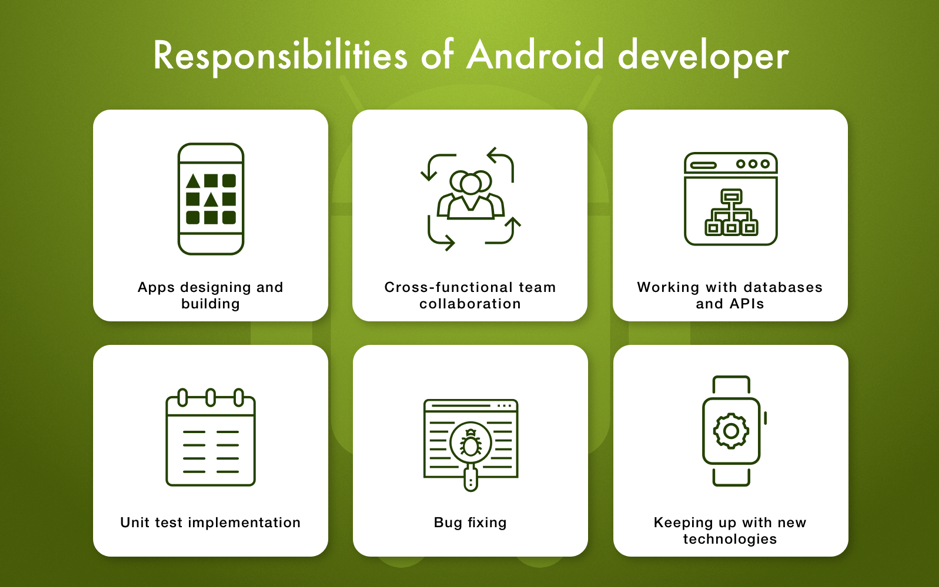A brilliant app idea demands no less a brilliant mobile development team. That means you have to take the time to search and recruit skilled Android developers and, correspondingly, overcome lots of challenges for this. Here are some tips to help you overcome the difficulties and mitigate possible problems in finding qualified Android developers.
Roles and Responsibilities of Android Developers
It’s always a good idea to dive deeper into your employees’ responsibilities. So if you have no technical background, this section will be rather useful for you as it tells more about the skills of a proficient Android developer.
It’s worth mentioning that the technical skills of Android and iOS developers differ due to the OS differences. A particular set of technologies is used for each OS and if you want to hire iOS developers, you should check the skills they need to have according to the latest market demands.
Skill Level
In the IT industry, developers are divided into levels specifying their proficiency. These levels are:
- Entry level means a developer hasn’t had much experience in developing software products. Junior Android developers typically work on simple projects and they’re curated by more experienced colleagues.
- Experienced developers work on complex projects and don’t have managerial responsibilities.
- Senior developers typically have 5+ years of experience and often lead big projects as well as supervise the performance of technical tasks.
Responsibilities
Let’s consider Android developers responsibilities in more details.

UI Engineering and Business Logic Development
Developers have to re-create the app’s design as well as develop its functionality. Additionally, they should predict what bugs may occur and prevent their appearance.
Collaborative Skills
In most cases, developers don’t work on a project alone. They are surrounded by other specialists and need to effectively collaborate with them in order to achieve a common goal: a well-functioning end product.
Databases and Third-Party APIs
Android developers should be good enough at reading code written by other developers since they will have to work with external APIs and databases during their projects.
Unit Testing
Modular testing is a kind of industry standard. Android developers have to perform it to test a certain part of the app’s functionality and fix any bugs. Unit testing is a part of agile software development that’s designed to create high-quality apps fast.
Bug Fixing
Android developers should make everything possible to deliver a bug-free and stable-working product.
Types of Android Developers
There are several types of developers you can choose from. Which one to pick depends on your preferences and project.
- Freelance developers. This type can be a good choice if you are on a limited budget and you want to save as much money as possible. However, bear in mind that, in fact, you have no control over freelancer’s work and all that remains is to rely on their responsibility.
- In-house developers. These are the ones working on your project at your company’s office. It’s a good option in case you already have an office space and you want to manage the development on your own.
- Outsourced team. The scheme is simple: You hire a software offshoring company, explain to them your requirements and they build a project for you from scratch.
Technical Skills of Android Developers
Android developers must have a set of technical skills that actually make the app development possible. Underneath, we’ve listed basic technologies every Android developer should be able to work with.
- Java: This is the official language for developing Android apps. This object-oriented language was created in 1995 and currently it’s the world’s most popular programming language. Every Android developer must have a decent knowledge of this language to build software.
- Kotlin: This is the second official language for Android development and many programmers are switching to it for various reasons.
- XML: Extensive Markup Language is broadly used for web development, but it is a necessary technology for Android development as well. In simple terms, XML is designed to provide the information exchange via the internet. So, if your app needs to be connected with the internet, developers have to use XML.
- Android SDK. Android software development kit is a set of programs for various purposes. For instance, it has the integrated tools for debugging, code testing, checking the compatibility with different OS versions, etc.
- Android Studio. It is an integrated development environment (IDE) developers use to write source code conveniently. This is possible due to a variety of built-in instruments (e.g. preview app for different OS versions).
- APIs: The ability to work with third-party APIs and integrate them into software is another requirement for Android developers. For example, if you need in-app payments, developers can use Stripe API and adapt a ready-made code to the app’s needs instead of architecting the payment system from scratch.
- Databases: Android developers should have skills of integrating cloud databases such as Firebase or local ones such as SQL for storing your app’s data.
- Material Design. It is the Android design language and developers should be acknowledged with its guidelines to build the app’s user interface in the right way.
 Android Developer Rates
Android Developer Rates
The price for IT services is typically indicated for one working hour. The prices also heavily depend on a region.
- North America: $150-170/h
- Australia: $110/h
- Western Europe: $70/h
- Eastern Europe: $35-50/h
Now you know what it takes to find a qualified Android developer!





